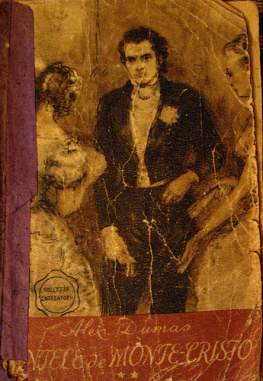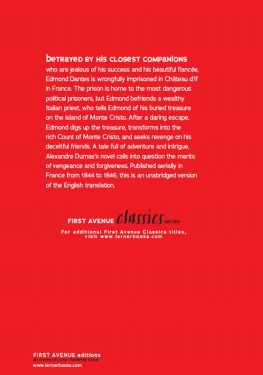Alexandre Dumas - The Count of Monte Cristo (Signet Classics)
Here you can read online Alexandre Dumas - The Count of Monte Cristo (Signet Classics) full text of the book (entire story) in english for free. Download pdf and epub, get meaning, cover and reviews about this ebook. year: 2005, publisher: Signet Classics, genre: Adventure. Description of the work, (preface) as well as reviews are available. Best literature library LitArk.com created for fans of good reading and offers a wide selection of genres:
Romance novel
Science fiction
Adventure
Detective
Science
History
Home and family
Prose
Art
Politics
Computer
Non-fiction
Religion
Business
Children
Humor
Choose a favorite category and find really read worthwhile books. Enjoy immersion in the world of imagination, feel the emotions of the characters or learn something new for yourself, make an fascinating discovery.
- Book:The Count of Monte Cristo (Signet Classics)
- Author:
- Publisher:Signet Classics
- Genre:
- Year:2005
- Rating:4 / 5
- Favourites:Add to favourites
- Your mark:
- 80
- 1
- 2
- 3
- 4
- 5
The Count of Monte Cristo (Signet Classics): summary, description and annotation
We offer to read an annotation, description, summary or preface (depends on what the author of the book "The Count of Monte Cristo (Signet Classics)" wrote himself). If you haven't found the necessary information about the book — write in the comments, we will try to find it.
The Count of Monte Cristo (Signet Classics) — read online for free the complete book (whole text) full work
Below is the text of the book, divided by pages. System saving the place of the last page read, allows you to conveniently read the book "The Count of Monte Cristo (Signet Classics)" online for free, without having to search again every time where you left off. Put a bookmark, and you can go to the page where you finished reading at any time.
Font size:
Interval:
Bookmark:


Published: 1845
Type(s): Novels, Adventure
Source: Feedbooks
Alexandre Dumas, pre, born Dumas Davy de la Pailleterie (July24, 1802 December 5, 1870) was a French writer, best known forhis numerous historical novels of high adventure which have madehim one of the most widely read French authors in the world. Manyof his novels, including The Count of Monte Cristo, The ThreeMusketeers, and The Man in the Iron Mask were serialized, and healso wrote plays and magazine articles and was a prolificcorrespondent. Source: Wikipedia
- The ThreeMusketeers (1844)
- Twenty YearsAfter (1845)
- Ten YearsLater (1848)
- The Vicomte ofBragelonne (1847)
- The BlackTulip (1850)
- TheBorgias (1840)
- Louise de laValliere (1849)
- Ali Pacha(1840)
- Murat(1840)
- MartinGuerre (1840)
http://www.feedbooks.com
Strictly for personal use, do not use this file for commercialpurposes.
Note: Footnotes are represented by * and are placed immediatelybelow the paragraph to which they refer ED.
On the 24th of February, 1810, the look-out at Notre-Dame de laGarde signalled the three-master, the Pharaon from Smyrna, Trieste,and Naples.
As usual, a pilot put off immediately, and rounding the Chateaud'If, got on board the vessel between Cape Morgion and Rionisland.
Immediately, and according to custom, the ramparts of FortSaint-Jean were covered with spectators; it is always an event atMarseilles for a ship to come into port, especially when this ship,like the Pharaon, has been built, rigged, and laden at the oldPhocee docks, and belongs to an owner of the city.
The ship drew on and had safely passed the strait, which somevolcanic shock has made between the Calasareigne and Jaros islands;had doubled Pomegue, and approached the harbor under topsails, jib,and spanker, but so slowly and sedately that the idlers, with thatinstinct which is the forerunner of evil, asked one another whatmisfortune could have happened on board. However, those experiencedin navigation saw plainly that if any accident had occurred, it wasnot to the vessel herself, for she bore down with all the evidenceof being skilfully handled, the anchor a-cockbill, the jib-boomguys already eased off, and standing by the side of the pilot, whowas steering the Pharaon towards the narrow entrance of the innerport, was a young man, who, with activity and vigilant eye, watchedevery motion of the ship, and repeated each direction of thepilot.
The vague disquietude which prevailed among the spectators hadso much affected one of the crowd that he did not await the arrivalof the vessel in harbor, but jumping into a small skiff, desired tobe pulled alongside the Pharaon, which he reached as she roundedinto La Reserve basin.
When the young man on board saw this person approach, he lefthis station by the pilot, and, hat in hand, leaned over the ship'sbulwarks.
He was a fine, tall, slim young fellow of eighteen or twenty,with black eyes, and hair as dark as a raven's wing; and his wholeappearance bespoke that calmness and resolution peculiar to menaccustomed from their cradle to contend with danger.
"Ah, is it you, Dantes?" cried the man in the skiff. "What's thematter? and why have you such an air of sadness aboard?"
"A great misfortune, M. Morrel," replied the young man, "agreat misfortune, for me especially! Off Civita Vecchia we lost ourbrave Captain Leclere."
"And the cargo?" inquired the owner, eagerly.
"Is all safe, M. Morrel; and I think you will be satisfied onthat head. But poor Captain Leclere "
"What happened to him?" asked the owner, with an air ofconsiderable resignation. "What happened to the worthycaptain?"
"He died."
"Fell into the sea?"
"No, sir, he died of brain-fever in dreadful agony." Thenturning to the crew, he said, "Bear a hand there, to take insail!"
All hands obeyed, and at once the eight or ten seamen whocomposed the crew, sprang to their respective stations at thespanker brails and outhaul, topsail sheets and halyards, the jibdownhaul, and the topsail clewlines and buntlines. The young sailorgave a look to see that his orders were promptly and accuratelyobeyed, and then turned again to the owner.
"And how did this misfortune occur?" inquired the latter,resuming the interrupted conversation.
"Alas, sir, in the most unexpected manner. After a long talkwith the harbor-master, Captain Leclere left Naples greatlydisturbed in mind. In twenty-four hours he was attacked by a fever,and died three days afterwards. We performed the usual burialservice, and he is at his rest, sewn up in his hammock with athirty-six pound shot at his head and his heels, off El Giglioisland. We bring to his widow his sword and cross of honor. It wasworth while, truly," added the young man with a melancholy smile,"to make war against the English for ten years, and to die in hisbed at last, like everybody else."
"Why, you see, Edmond," replied the owner, who appeared morecomforted at every moment, "we are all mortal, and the old mustmake way for the young. If not, why, there would be no promotion;and since you assure me that the cargo "
"Is all safe and sound, M. Morrel, take my word for it; and Iadvise you not to take 25,000 francs for the profits of thevoyage."
Then, as they were just passing the Round Tower, the young manshouted: "Stand by there to lower the topsails and jib; brail upthe spanker!"
The order was executed as promptly as it would have been onboard a man-of-war.
"Let go and clue up!" At this last command all the sails werelowered, and the vessel moved almost imperceptibly onwards.
"Now, if you will come on board, M. Morrel," said Dantes,observing the owner's impatience, "here is your supercargo, M.Danglars, coming out of his cabin, who will furnish you with everyparticular. As for me, I must look after the anchoring, and dressthe ship in mourning."
The owner did not wait for a second invitation. He seized a ropewhich Dantes flung to him, and with an activity that would havedone credit to a sailor, climbed up the side of the ship, while theyoung man, going to his task, left the conversation to Danglars,who now came towards the owner. He was a man of twenty-five ortwenty-six years of age, of unprepossessing countenance, obsequiousto his superiors, insolent to his subordinates; and this, inaddition to his position as responsible agent on board, which isalways obnoxious to the sailors, made him as much disliked by thecrew as Edmond Dantes was beloved by them.
"Well, M. Morrel," said Danglars, "you have heard of themisfortune that has befallen us?"
"Yes yes: poor Captain Leclere! He was a brave and an honestman."
"And a first-rate seaman, one who had seen long and honorableservice, as became a man charged with the interests of a house soimportant as that of Morrel & Son," replied Danglars.
"But," replied the owner, glancing after Dantes, who waswatching the anchoring of his vessel, "it seems to me that a sailorneeds not be so old as you say, Danglars, to understand hisbusiness, for our friend Edmond seems to understand it thoroughly,and not to require instruction from any one."
Font size:
Interval:
Bookmark:
Similar books «The Count of Monte Cristo (Signet Classics)»
Look at similar books to The Count of Monte Cristo (Signet Classics). We have selected literature similar in name and meaning in the hope of providing readers with more options to find new, interesting, not yet read works.
Discussion, reviews of the book The Count of Monte Cristo (Signet Classics) and just readers' own opinions. Leave your comments, write what you think about the work, its meaning or the main characters. Specify what exactly you liked and what you didn't like, and why you think so.






